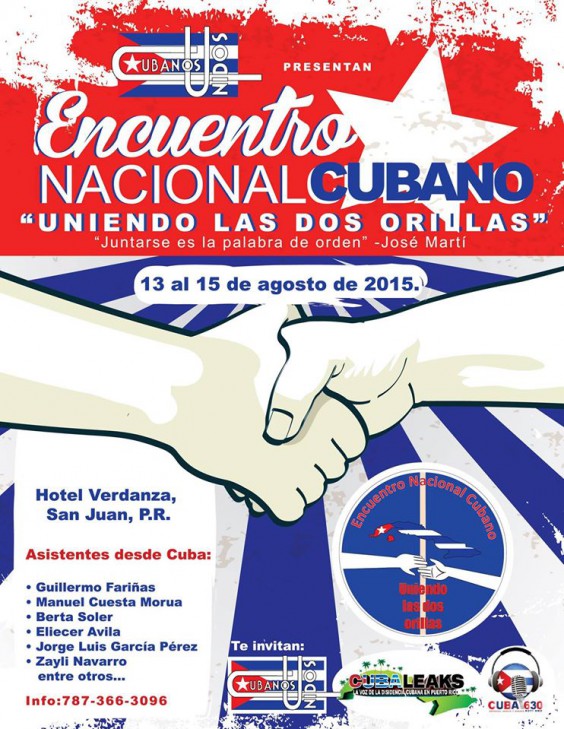Cuba, Happiness is Coming!
by Orlando Luis Pardo Lazo translated by Alex Higson / August 31, 2015 / 1 Comment

The National Cuban Congress took place in Puerto Rico earlier this month. Photo via: Cubanos Unidos de Puerto Rico.
Just before the flag was raised over the US Embassy in Havana, dissidents gathered in Puerto Rico to formulate a plan for achieving democracy in Cuba.
A miracle happened between August 13 and 15: the First National Cuban Congress took place, organized by Cubans United (Cubanos Unidos), a citizens’ initiative that has just been launched to the Cuban people and the international community. Cubans United is a global campaign to bring democracy to the island and, in the words of José Martí, the apostle of Cuban independence, act “with all and for the good of all.”

- Is it worth-while to focus on the last images and letters coming from the inside of the last living utopia on Earth? Is Cuba by now a contemporary country or just another old-fashioned delusion in the middle of Nowhere-America? A Cold-War Northtalgia maybe? Can we expect a young Rewwwolution.cu within that Ancien Régime still known as The Revolution? I would like to provoke more questions than answers.

- Orlando Luis Pardo Lazo was born in Havana City. He is the author of Boring Home (2009) and is the editor of the independent opinion and literary e-zine Voces.
The miracle took place very close to Cuba, on its Caribbean sister island of Puerto Rico. There could be no better place, since, as Puerto Rican poet Lola Rodríguez de Tío wrote a century ago: “Cuba and Puerto Rico are / the two wings of a bird. / They take flowers or bullets / into the same heart.”
Despite the fates of our two islands apparently being polar-opposites, they share a loss of independence and of sovereignty, respectively. In Puerto Rico, this is thanks to the presence of the United States; in Cuba, this happened under the dynastic dictatorship of the Castro clan.
The Congress saw the participation of more than one hundred dissidents: political opponents, community leaders, international observers, social activists, graphic artists, film makers, and freelance journalists, some who are in Cuba and some who live in exile. They took part either as individuals or as representatives of 55 Cuban dissident groups, 32 of which are based outside of the island. It was a great privilege for me to be able to participate in this inaugural Congress.
Reaching an agreement between so many polemical lines of thought, between so many fighters and thinkers from every movement and generation, all in a suite at the Hotel Verdanza, was in itself a great achievement for Cuban harmony. It is also a sign that now is the time to come to an agreement to put an end to decades of perpetual Castroism, and to spread that hope for the chance to really live, as a free people; to know that we can exercise our rights as citizens no matter what corner of the globe we live in. We have but one shared culture, just as we have one governmental apartheid violently and artificially dividing us.
By calling for amnesty for all of Cuba’s political prisoners, and demanding our right to exercise freedom of speech, association, assembly, profession, religion, and peaceful protest, among many other things, we Cubans can from now on strengthen our participation in the country’s most crucial decisions. As circumstances now stand, we continue to see our fundamental rights being held hostage in the hands of a regime that has never been elected. It is time to move beyond its totalitarian ideology and that tedious soap opera of Imperialism and Revolution.
To this end, the National Congress has launched a unique and participatory strategy: a campaign for a binding plebiscite in Cuba to answer the question of whether we should move to fair, multiparty elections, with guarantees that citizens will have representation and even that they can represent themselves. This requires an atmosphere of trust. This movement will come about through nonviolent efforts and resistance, making the most of new technologies that, while currently heavily censored in Cuba, are still of importance for citizens’ awakening and mobilization.
All this is summarized in the Declaration of San Juan, which is not a party-political document, but rather should be seen as a resurgence of Cuban civility after far too many years of following despotic orders in a tradition akin to the most decrepit military discipline.
If Cuba’s intellectual movement is awakening, if Cuban art is awakening, if Cuban culture is awakening, then—surely?—Cuban politics will awaken too. And so we will journey from dictatorship to democracy, through the route of decency.
Do you remember the slogan of General Pinochet’s lost Chilean plebiscite in October 1988? The opposition won with a very simple motto: “Chile, happiness is coming!”
That is why your signature counts more now than ever before: so that the first page of our future does not turn to dust between our fingers. And so that, beyond Fidel and his imitators, our dismal tradition of criminal caudillos and their accomplices who force us into silence can never be allowed to return. Join us, and add your names to ours, please, at Cuba Decide.





One Comment on "Cuba, Happiness is Coming!"
The National Congress approved, not launched, a plebiscite when Democratic conditions are present in Cuba.